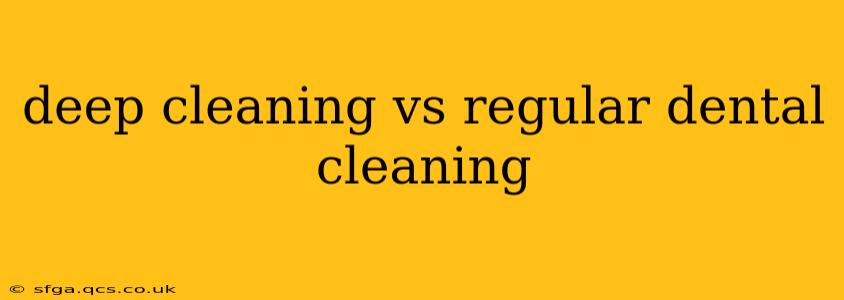Maintaining optimal oral health requires a commitment to regular dental hygiene. But what exactly is the difference between a regular cleaning and a deep cleaning? Understanding the distinction is crucial for preventing gum disease and preserving your smile. This comprehensive guide will clarify the differences, helping you understand which procedure is right for you.
What is a Regular Dental Cleaning?
A regular dental cleaning, also known as a prophylaxis, is a preventative procedure designed to maintain good oral health. These cleanings are typically recommended every six months, although your dentist may recommend more frequent visits depending on your individual needs and oral health. During a regular cleaning, your dentist or hygienist will:
- Remove plaque and tartar: These sticky films build up on your teeth, leading to cavities and gum disease if left unchecked. Specialized tools like scaling instruments are used to meticulously remove these deposits from both above and below the gumline.
- Polish your teeth: After removing plaque and tartar, your teeth are polished to a smooth, shiny finish, making it harder for plaque to reattach.
- Examine your gums and teeth: Your dentist will carefully examine your mouth for any signs of decay, gum disease, or other oral health issues. They'll also check your bite and the overall health of your jaw.
- Provide oral hygiene instruction: You'll receive personalized advice on brushing, flossing, and other aspects of your home oral hygiene routine to maintain optimal dental health between visits.
What is a Deep Cleaning (Scaling and Root Planing)?
A deep cleaning, officially called scaling and root planing, is a more intensive procedure necessary for individuals with gum disease (periodontitis or gingivitis). Unlike regular cleanings, deep cleanings go below the gum line to thoroughly remove bacteria and toxins that contribute to gum disease. The procedure typically involves:
- Scaling: This removes plaque and tartar from below the gum line, where regular cleanings can't reach. Specialized instruments are used to carefully clean the tooth roots.
- Root planing: This process smooths the tooth roots, making it more difficult for bacteria to reattach and preventing further gum inflammation.
- Local anesthesia: Deep cleanings often involve local anesthesia to ensure comfort during the procedure.
- Multiple appointments: Due to its complexity, a deep cleaning usually requires multiple appointments, often one or two quadrants of the mouth per appointment.
How Often Should I Get a Regular Cleaning?
The general recommendation for regular dental cleanings is every six months. However, individuals with a higher risk of gum disease or other oral health problems might need more frequent cleanings. Your dentist will assess your individual needs and recommend a suitable cleaning schedule.
How Often Should I Get a Deep Cleaning?
The frequency of deep cleanings depends on the severity of your gum disease and how well you maintain your oral hygiene at home. Your dentist will determine the appropriate interval, which might range from once a year to every few years.
What are the Signs I Need a Deep Cleaning?
Several signs indicate the need for a deep cleaning:
- Bleeding gums: Persistent bleeding while brushing or flossing is a key indicator of gum inflammation.
- Swollen or red gums: These symptoms suggest gum irritation and possible infection.
- Receding gums: Gums that pull away from the teeth, exposing the roots, are a serious sign of gum disease.
- Persistent bad breath: Bad breath that doesn't improve with good oral hygiene might signal underlying gum disease.
- Loose teeth: If your teeth feel loose or are shifting, it could be a sign of advanced gum disease.
What's the Difference in Cost Between Deep Cleaning and Regular Cleaning?
Deep cleanings are typically more expensive than regular cleanings because they are more time-consuming and require more extensive procedures. The exact cost will vary depending on your location, the dentist's fees, and the extent of the cleaning required. Insurance coverage also plays a significant role in the out-of-pocket expense.
Can I Prevent the Need for Deep Cleaning?
Yes, diligent home oral hygiene is essential for preventing the need for deep cleanings. This includes brushing twice daily with fluoride toothpaste, flossing daily, and using an antiseptic mouthwash as directed by your dentist. Regular dental checkups and professional cleanings are equally crucial in maintaining optimal oral health. Catching gum disease early can often prevent the need for more extensive procedures like deep cleanings. A healthy lifestyle, including a balanced diet, also contributes to overall oral and systemic health.
This information is for educational purposes only and should not be considered medical advice. Always consult with your dentist to determine the appropriate cleaning schedule and treatment plan for your individual needs.
